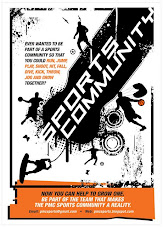A number of folks have asked about what it takes to complete a marathon, training program, nutrition, hydration, preparation, etc.
As I am fond of saying: "If I can do it, so can you!"
Here are some thoughts on what you can do:
Marathoning should be a longer term goal, and many people go from 5ks to 10ks to half marathons before attempting the full. So start modestly, build up your mileage consistently over time. It is important to have a strong aerobic/cardio base that may take 12 months or more to build up.
How do people run? The elite runners - they run fast all the way, not even stopping for water! That's a different story, of course. For me and many other people I know, we find that we have to take short walk breaks, especially after running for more than 2 hours. Some of us use a deliberate walk-run approach, made famous by Galloway. The idea is to run say 5 min and walk 1 min (5:1 ratio), and to do this right from the start of the run (rather than only when one is tired). The idea is to allow the muscles to rest so that they can work longer and to limit cardiac drift so that we don't go anaerobic (i.e. maintain heart rate in aerobic / fat burning zone). Many friends use this approach for their first marathons, even though they are strong runners.
You can find more information about walk-run here: http://bfgmidliferunning.blogspot.com/2008/07/walk-breaks_29.html
Most people don't appreciate how important nutrition is and they hit the wall or bonk in the later part of the marathon. Usually we carry our own hydration and nutrition during training runs of more than 15 km, but on race day, water stations provide isotonic drinks and water, usually about 2 km apart. There's usually one station that provides gel and bananas/fruits. Gels are liquid carbohydrates (about 100 cal) to help us sustain our energy levels. We expend about 500 cal per hour in running. So a marathon that takes up to 5 hours would expend 2,500 cal. This is higher than our daily intake of calories! I ingest about 4 to 5 gels for 42 km.
For race day preparation, what we advise is to build in a taper. So for the week before your race, don't do long runs. Keep your runs short, say up to 5 km (for a 10k race), but maintain the intensity/pace that you would like to run during the race. Take a rest day the day before the race to keep the legs fresh. There's the race expo / collection of race pack. Usually I pin my bib on the running tee the night before, pack all the necessary run gear and have an early night's sleep. Go early so as not to rush. There's the bag deposit and porties that may see long queues.
The keys to successfully completing a marathon are commitment, discipline and a good training program!
The PMC running community has two successful running programs that helped our friends complete the full marathons at last year's SCSM and the more recent Sundown marathon.
To find out more about running, please drop an email to:
SE Ong (seong350@gmail.com)
Ong Peng Kiat (opk.alpha@yahoo.com.sg)
Teo Teck Hui (teo_t_h@yahoo.com.sg)
Subscribe to:
Post Comments (Atom)
.jpg)

No comments:
Post a Comment